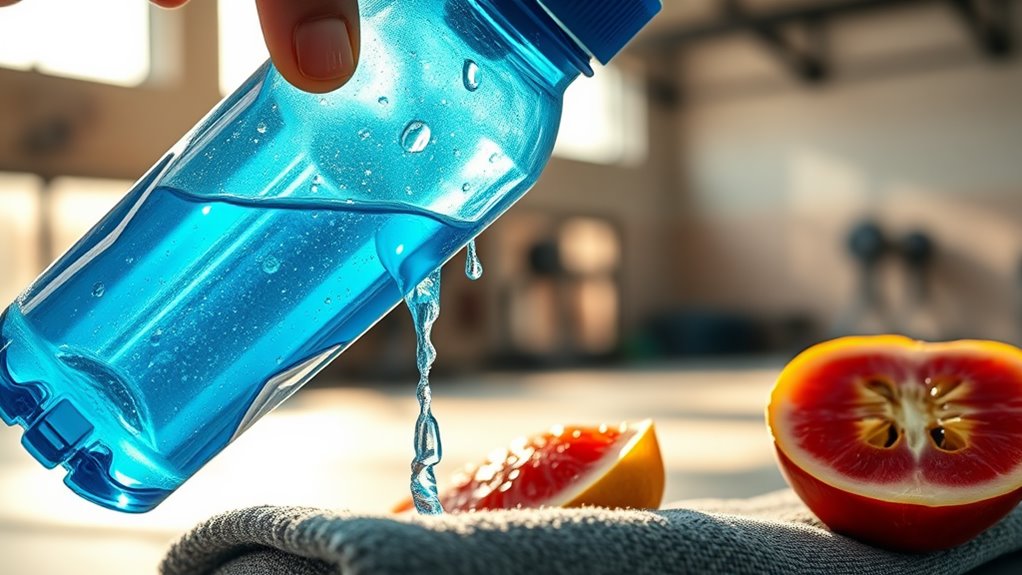
To rehydrate after exercise, drink 1.2 to 1.5 liters of water for every kilogram of body weight lost, and aim for a rehydration rate of 1.35 liters or less per hour. Monitor your urine color; it should look like lemonade, not dark yellow. During workouts, sip 7 to 10 ounces of water every 10 to 20 minutes for ideal hydration. Consider incorporating electrolytes from drinks or foods to enhance recovery. There's more to learn about effective rehydration strategies!
When you finish exercising, your body needs immediate attention to rehydrate effectively. Dehydration can manifest as dark urine, a dry mouth, and muscle cramps, all signals that you need to act quickly. To replace lost fluids, a general guideline recommends consuming 1.2 to 1.5 liters of water for every kilogram of body weight lost during your workout. This guarantees your body can recover properly and maintain ideal performance levels.
Rehydrate promptly after exercise to prevent dehydration and support recovery—aim for 1.2 to 1.5 liters of water per kilogram lost.
To accurately assess your fluid loss, weigh yourself before and after exercise, making sure to account for any fluids you consumed during your workout. For every pound you lose, aim to drink about 24 ounces of fluid. This method not only helps you rehydrate efficiently but also keeps you aware of how much you need to drink going forward.
It's important to remember that drinking too much too quickly can lead to hyponatremia, so aim for a rehydration rate of 1.35 liters or less per hour. Tracking your urine color can act as a helpful guide; ideally, you want it to resemble the color of lemonade. Dark yellow or amber urine indicates concentrated fluid levels and dehydration.
Fluid intake during exercise is also important. Aim to drink 7 to 10 ounces of water every 10 to 20 minutes while working out. This strategy helps confirm you're not only staying hydrated during exercise but also enhancing your recovery afterward.
On rest days, you should aim to drink roughly half your body weight in ounces of water to stay hydrated and support overall health.
While plain water is great for mild hydration needs, incorporating electrolytes can notably improve your rehydration process, especially after intense workouts. Sodium, potassium, and magnesium are essential for maintaining your body's fluid balance.
Consider using electrolyte tablets or powders, or opt for sports drinks that contain these minerals. Coconut water and bone broth are excellent natural options as well. They help replenish lost electrolytes and offer additional minerals that can aid recovery.
In addition to drinks, incorporating hydrating foods into your post-exercise meals can also support your rehydration efforts. Fruits and vegetables like watermelon and cucumber have high water content, making them ideal for rehydration. While these foods may not be practical to consume during your workout, they're perfect for post-exercise recovery.
Creating a hydration strategy is fundamental for maximizing both performance and recovery. Start hydrating well before you exercise, and continue to rehydrate for several hours afterward.
This consistent approach will help you maintain energy levels and reduce the risk of fatigue and cramping. Remember that your body's hydration needs change depending on the intensity and duration of your workouts, so adjust your fluid intake accordingly.
Conclusion
In the grand tapestry of recovery, rehydration is your thread of importance. By replenishing lost fluids, you not only nurture your body but also embrace the essence of renewal. Remember, each sip is a step toward revitalization, helping you bounce back stronger. So, as you quench your thirst, know that you're weaving resilience into your fitness journey. Stay mindful of your hydration, and you'll find that your body, like a well-tended garden, flourishes with every effort.



